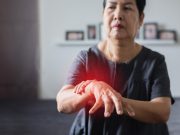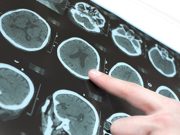Tag: Parkinson’s
Upper GI Mucosal Damage Tied to Later Parkinson Disease Diagnosis
Authors say increased vigilance is warranted for patients with mucosal damage
Migraine in Women Not Linked to Risk for Parkinson Disease
No associations seen for migraine with aura, migraine without aura, history of migraine in cohort of middle-aged women
Dementia May Occur Less Often, Develop Slower in Parkinson Disease Patients
Median time to dementia was 15 years in Penn cohort; estimated probability of dementia at year 10 was 9 to 15 percent in PPMI cohort
Fecal Microbiota Transplant No Aid for Parkinson Disease
At six months, no significant changes seen in Movement Disorder Society Unified Parkinson’s Disease Rating Scale scores versus placebo
Risk of Parkinson Disease Heightened in People With Anxiety
Certain clinical features may identify those who may be in prodromal phase of Parkinson disease
Parkinsonism Occurs Frequently in Chronic Traumatic Encephalopathy
More severe CTE stage and nigral pathology seen for participants with parkinsonism versus those without parkinsonism
Structure, Function of Brain Connectome Tied to Gray Matter Atrophy in Parkinson Disease
Models including disease exposure indexes predict gray matter atrophy accumulation
Acupuncture Aids Sleep in Patients With Parkinson Disease
Benefits persist four weeks after treatment
Smartwatch, Smartphone Can Assess Parkinson Disease Progression
Change in digital measures over 12 months generally larger than corresponding change in individual items of the Movement Disorder Society scale
Subcutaneous Infusion of Levodopa-Carbidopa Beneficial for Parkinson Disease
Infusion increases on time without troublesome dyskinesia and reduces daily off time














